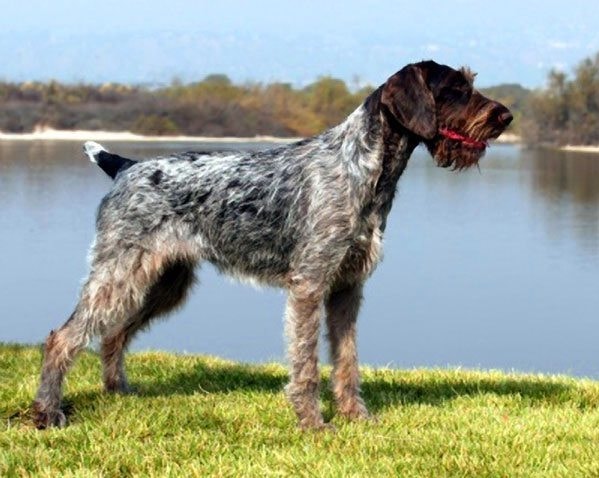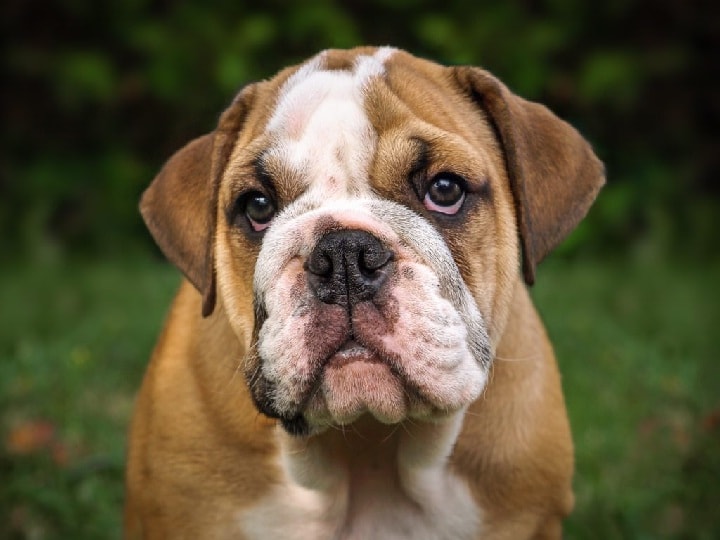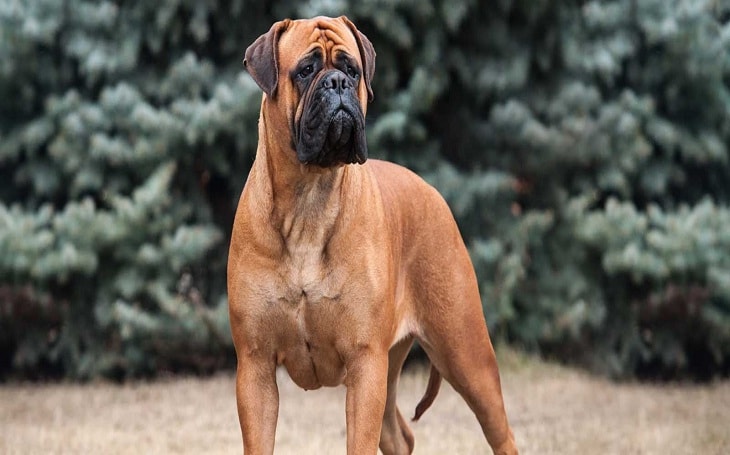Bullmastiff – Dog Breed Information
| Country of Origin | United Kingdom |
| Nicknames and Other Names | None |
| Scientific Name | Canis lupus familiaris |
| Breed Type | Purebred |
| Group | Guardian Dog Working Group |
| Bred For | Guard estates |
| Size | Large-sized |
| Recognized By | AKC, CKC, ANKC, UKC, FCI, NZKC, KC |
| Life Span | 7-9 years |
| Ideal Weight | Male: 110-130 pounds Female: 100-120 pounds |
| Ideal Height | Male: 25-27 inches Female: 24-26 inches |
| Fur Type | dense, short, weather-resistant |
| Common Colors | Fawn, Red Brindle, Red, Red Fawn Brindle, Fawn Brindle |
| Markings | Black Mask |
| Availability | Moderately available |
| Achievements | Featured in movies and show |
| Suitable for Apartments | No |
| Used in World War | No |
| Most Similar To | Mastiff |
The Bullmastiff is a large and powerfully build dog having a big head that has a black patch on the face, wrinkled head, and dark hazel eyes. They have V-shaped dark ears. They are very protective of their people and property which make them a great watchdog.
Bullmastiff does well with people but are somewhat aggressive towards other animals, especially towards male dogs. They have a strong prey drive and are not suitable to live with small animals like cats.
Origin and History
The Bullmastiff was developed in the 19th century by crossing Bulldogs and Mastiffs together. They were bred to protect English estate from illegal hunters. They were not bred to attack any intruder but to hold them until the owner returns.
The Bullmastiff is recognized by the American Kennel Club in 1993 and currently ranked 48 of 193 other registered breed.
Is Bullmastiff Child-Friendly?
Bullmastiff does very well with children. They are patient and tolerant of them but due to their large built body, they might knock over small children. They should be watched and supervised.
Behavior, Temperament and Personality
Bullmastiff is loving and affectionate towards family members. They are loyal and protective of their people and do well as a family pet. However, they are very suspicious of strangers and should be socialized with variety of people at its early age.
Bullmastiff makes a great watchdog and will warn his master if he sees anything suspicious around them. Although they are powerful and originally bred to protect property, they are not likely to attack an intruder. In fact, they will hold them until their master comes back.
Trainability
Bullmastiff is easy to train if it falls on the hand of a consistent and confident leader. They are not for a first-time dog owner or a person with a soft heart. They need positive reinforcement methods of training that includes treats and lots of vocal praises. However, don’t include only treats as a reward as they will only obey you if you have some treat on your hand.
Facts
- Bullmastiff was not trained to bark or bite. They were trained to track the intruder and hold them.
- Although they have a powerful body, they only need moderate exercise to keep them content.
- Bullmastiff were used in police and army service in past.
Health Issues
Bullmastiff is prone to hereditary defect and is less likely to suffer from any serious health problems. The average life expectancy of this breed is 8-10 years, which is less compared to many other dog breeds. Some of the common canine diseases that they might suffer are listed below:
- Hip Dysplasia
- Bloat
- Allergies
- Elbow Dysplasia
Coats and Colors
Bullmastiff has a short and dense coat that shed moderately throughout the year. Their coat comes in three colors, red, fawn or brindle.
Puppies
Cost
The average cost of Bullmastiff puppy is between $1500- $2000. If you want to adopt then it will cost around $300 with the expenses of taking care of the puppy.
Size
The height of the male Bullmastiff is from 25 to 27 inches and female is from 24-26 inches. The weight of the male Bullmastiff is between 110 to 130 pounds and female is between 100 to 120 pounds.
Similar Dog Breeds to Bullmastiff

German Wirehaired Pointer

English Bulldog
Visit Doglime for more breed information about dog behavior.
Tags










